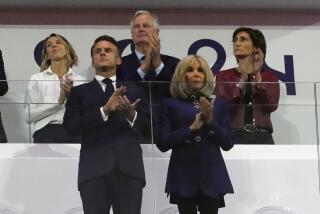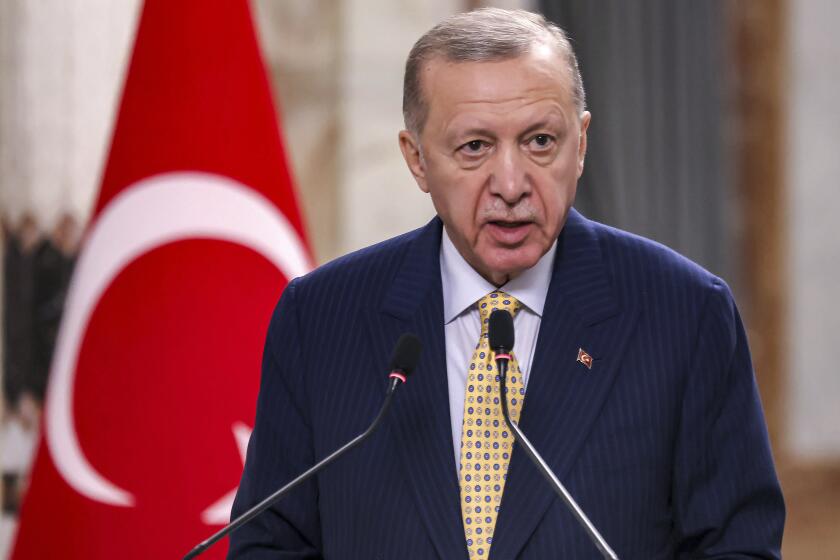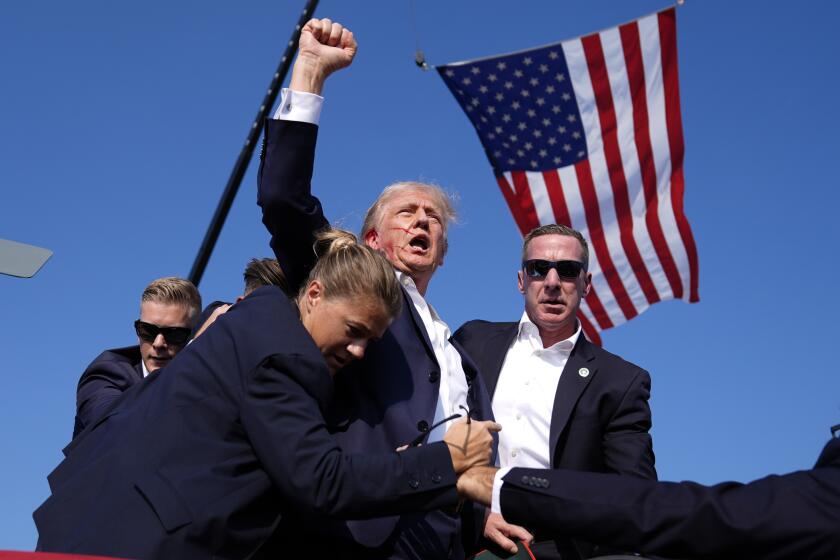Bush alters diplomatic dance with Dalai Lama
On his two previous visits with President Bush, the Dalai Lama was escorted into the White House residence, rather than into the Oval Office -- a subtle indication that he was being received as a spiritual rather than political leader. The purpose was to avoid irritating Chinese leaders, who see any official recognition of the exiled Tibetan Buddhist leader as a sign of support for Tibetan independence.
But next week, when the Dalai Lama visits Washington, the Bush administration will alter the diplomatic pas de deux.
The president and First Lady Laura Bush will meet Tuesday with the Dalai Lama in the residential quarters of the White House. But the president will also encounter him the next day in a public and official setting: the Capitol, where the religious leader will receive the Congressional Gold Medal.
Beijing has taken note. On Thursday, the government denounced the congressional presentation. The White House has tried to play down the situation.
The choreography of the Dalai Lama’s visit -- his 12th with a current or former U.S. president, his third with Bush and his 28th to the United States -- reflects the extreme sensitivity of U.S.-Chinese relations, which involves issues of human rights, religion and democracy.
The White House is seeking to avoid souring relations over human rights while sending a signal of support for rights campaigners.
At a regularly scheduled Thursday news conference in Beijing, the Associated Press reported, Chinese Foreign Ministry spokesman Liu Jianchao said that “China resolutely opposes the U.S. Congress awarding the Dalai its so-called Congressional Gold Medal, and firmly opposes any country or any person using the Dalai issue to interfere in China’s internal affairs.”
The Dalai Lama, who won the Nobel Peace Prize in 1989, presents a case for Tibetan autonomy, but not independence, and has come to personify the campaign for increased human rights in China and democracy in Tibet.
The Congressional Gold Medal of Honor, as it is formally known, is Congress’ highest civilian honor. It is being awarded to the Dalai Lama to recognize what Congress called “his many enduring and outstanding contributions to peace, nonviolence, human rights and religious understanding.”
Bush alerted Chinese President Hu Jintao during a meeting in Sydney, Australia, in early September that he planned to attend the ceremony at the Capitol honoring the Dalai Lama. But at the same meeting, Bush also announced that he would attend the Summer Olympics in 2008 in Beijing -- awarding the Chinese a much-sought stamp of approval.
Giving Hu a heads-up was “a good way to handle it,” said Harry Harding, a professor of international affairs at George Washington University and an expert on Chinese domestic politics and U.S.-Chinese relations. “The Chinese don’t like to be blindsided.”
But, he said, Bush was “giving with one hand and taking away with the other,” and the Chinese would certainly “regard it as a poke in the eye.”
White House Press Secretary Dana Perino said that in the Capitol ceremony, Bush would offer only brief remarks and would “reiterate our view that the Dalai Lama is a great spiritual leader” who is leading a movement aimed not at Tibetan independence but at securing Tibetans’ rights.
“We would hope that the Chinese leader would get to know the Dalai Lama as the president sees him, as a spiritual leader and someone who wants peace,” Perino said, adding that Bush understood “that the Chinese have concerns about this.”
She and others at the White House emphasized that Bush has attended previous Gold Medal ceremonies at the Capitol, and so his decision to attend this one was in keeping with his practice -- even if it elevated the contact with the Tibetan.
“The White House can argue, correctly, that there is nothing new because the president always goes to the Congressional Gold Medal ceremony, and the Dalai Lama always meets with the president and first lady,” said Michael J. Green, a senior advisor at the Center for Strategic and International Studies in Washington who was senior director for Asian affairs at the National Security Council in 2004 and 2005.
But Green said it’s significant that the president is meeting the Dalai Lama in a public ceremony at the Capitol: “This is something different.”
--
More to Read
Sign up for Essential California
The most important California stories and recommendations in your inbox every morning.
You may occasionally receive promotional content from the Los Angeles Times.








